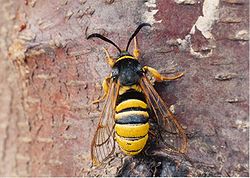Sesia bembeciformis
Appearance
| Sesia bembeciformis | |
|---|---|

| |
| Scientific classification | |
| Kingdom: | |
| Phylum: | |
| Class: | |
| Order: | |
| Family: | |
| Genus: | |
| Species: | S. bembeciformis
|
| Binomial name | |
| Sesia bembeciformis (Hübner, 1806)
| |
| Synonyms | |
| |
Sesia bembeciformis, the lunar hornet moth, is a moth of the family Sesiidae. It is found in Europe.

The wingspan is 32–42 mm. The length of the forewings is 15–19 mm. The moth flies from June to August depending on the location.
The larvae feed on willow.
External links
Wikimedia Commons has media related to Sesia bembeciformis.
